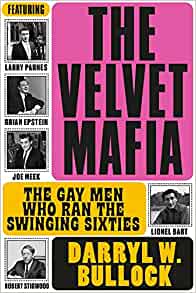By Paul Clements, Yahoo | If Russell T Davies wishes to follow his hit Aids-era saga, It’s a Sin, with another “queeriod” drama set against British social history, he could do worse than rewind to the Fifties skiffle scene for inspiration. There, the man who also gave us A Very English Scandal, about the infamous Jeremy Thorpe trial, would find many more attractive dramatis personae – but not the likes of Lonnie Donegan, Billy Fury or the other pretty-boy pioneers of British rock ’n’ roll. Rather, the seemingly disparate cohort of mostly unhappy gay men who managed, produced and wrote for such artists, and turbocharged Britain’s globally successful pop movement.
Throughout the Fifties and Sixties, gay Svengalis like Brian Epstein, Larry Parnes, Lionel Bart, Robert Stigwood and Joe Meek worked behind the scenes for some of the UK’s most successful acts. Without them, as The Velvet Mafia, a new book by Darryl W Bullock, makes clear, it’s possible there would have been no fainting teenage fans, no pioneering studio techniques to propel the early-Sixties US chart invasion, no Cliff, no Shadows, no Stones, no Who… no Beatles. Yet the Svengalis’ own names register far less today, and most lived lives of quiet desperation during a time when homosexual acts between men were illegal, and to be gay was to be part of a secretive, subterranean world.
Indeed in his exhaustive study, music historian Bullock plots how a handful of troubled characters and their associates networked and back-scratched their way to success, without ever finding much romantic satisfaction by way of reward. A black eye from the rough trade demanding hush money and accidental overdoses were occupational hazards. Still, throw in Ready Steady Go, gangster-run Soho clubland, the Profumo Affair, Russian secret agents, and guest appearances from, among others, The Krays, Judy Garland and Liberace, and you can see how it could be another sure-fire smash for Davies. And, boy, what a soundtrack there’d be.
Britain’s first rock ’n’ roll manager is billed as Larry Parnes, not least for being fastest out of the traps in realising that, in the teen era, “cute young men were a commodity, a product to be packaged and sold” as Bullock puts it. “Parnes saw how the onslaught of American artists was stealing the hearts and emptying the pockets of British teenagers, and the businessman in him fancied a slice of that pie.”
Born in 1930, Parnes started out as an errand boy in his parents’ fashion shops around Willesden, north London, before branching out into talent management. His fortunes lifted off in 1956 by hanging around Soho’s hippest coffee bar, the 2i’s on Old Compton Street, where skiffle acts would try out. It was here he met Tommy Steele who, under his not so much guidance but complete control, would become Britain’s first home-grown pop star.
It was with Steele (born Hicks) that Parnes – who based himself on the only celebrity manager anyone had heard of, Col Tom Parker – perfected his blueprint: handsome young man with teen-idol looks who, after a name change to suit his image, would be attractive to young audiences and, despite often limited musical ability, could perform songs that Parnes had co-written with his friend Lionel Bart, further increasing takings. Variety shows and film roles would beckon, broadening the turn’s appeal, while the manager sat back and revelled in the nickname given to him by the papers: “Mr Parnes, Shillings and Pence”.
> > > > > > > >
If there’s one character who runs through the era, a proverbial pink stick of rock, it’s the fifth Beatle, Brian Epstein. Cultivated, immaculately turned out and well-spoken, with not a hint of his native Liverpool left in his accent, Epstein was as far removed from the gangsterish band managers of the Sixties as was possible. It was he who defined the band’s look by shucking them out of their Reeperbahn leathers into suits and ties, organizing television appearances and profile-raising PAs that built a fan base to end all others.
His sexuality was never a problem to the Beatles – only to himself. When Epstein permitted a line to appear in his highly sanitized 1964 autobiography, A Cellarful of Noise, which hinted he was “attracted” to the four of them, it was John Lennon who teased him: he should have called it “A Cellarful of Boys” or even “Queer Jew” instead. In one of his final interviews, he sweetly described his relationship with Epstein as “almost a love affair, but not quite – it was never consummated”.
> > > > > > > >
Throughout the book, Bullock also shows how the players quietly supported each other professionally, too. I was tantalized by the suggestion Epstein had initially approached Joe Meek, the flamboyant producer of Telstar fame and Britain’s answer to Phil Spector, to work with the Beatles. Famously, an unimpressed Meek turned them down four times. Tragically both Epstein and Meek would die young in 1967: the former of an accidental drug overdose, the latter shooting his landlady and then himself in the midst of a depression. One can only imagine how such a collaboration might have altered the Fabs’ trajectory.
The Velvet Mafia by Darryl W Bullock (Omnibus) is out now. [Be sure to comparison shop: We found prices ranging from $19 up to $30 for this book.]
https://www.yahoo.com/lifestyle/gay-svengalis-shaped-future-british-162209189.html
.


